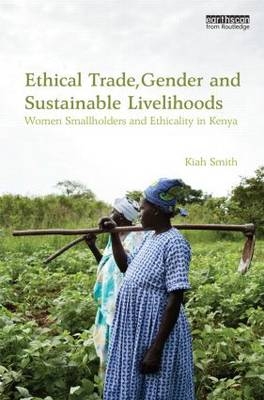
Ethical Trade, Gender and Sustainable Livelihoods
Women Smallholders and Ethicality in Kenya
Seiten
2014
Routledge (Verlag)
978-0-415-82154-4 (ISBN)
Routledge (Verlag)
978-0-415-82154-4 (ISBN)
Through an in-depth case study of smallholder subsistence and French bean farming in Kenya, this book grounds the analysis of livelihoods, gender and ethical trade in women smallholders’ perspectives, links the macro level of markets with the micro level of livelihoods, and engenders relations of power, structure and agency in food networks.
Fair and ethical trade is often criticized for being highly gendered, and for institutionalizing the ethical values of consumers, the priorities of NGOs and governments, and most of all, food retailers. But little is known about how women smallholder farmers experience diverse ethical standards, or whether and how standards reflect their values, local cultural and environmental contexts, or priorities for achieving sustainable livelihoods.
Linking gender, smallholder livelihoods and global ethical trade regulations, this book reveals that multiple understandings of social justice, environmental sustainability and well-being – or ethicality – exist in parallel to those institutionalized in ethical trade schemes. Through an in-depth case study of smallholder subsistence and French bean farming in Kenya, the book grounds the analysis of livelihoods, gender and ethical trade in women smallholders’ perspectives, links the macro level of markets with the micro level of livelihoods, and engenders relations of power, structure and agency in food networks.
It brings together disparate bodies of theory to illustrate the knowledge, strategies and values of women smallholder farmers that are often beyond the scope of ethical trade regulations. It also provides a challenging new vision for doing food systems research.
Fair and ethical trade is often criticized for being highly gendered, and for institutionalizing the ethical values of consumers, the priorities of NGOs and governments, and most of all, food retailers. But little is known about how women smallholder farmers experience diverse ethical standards, or whether and how standards reflect their values, local cultural and environmental contexts, or priorities for achieving sustainable livelihoods.
Linking gender, smallholder livelihoods and global ethical trade regulations, this book reveals that multiple understandings of social justice, environmental sustainability and well-being – or ethicality – exist in parallel to those institutionalized in ethical trade schemes. Through an in-depth case study of smallholder subsistence and French bean farming in Kenya, the book grounds the analysis of livelihoods, gender and ethical trade in women smallholders’ perspectives, links the macro level of markets with the micro level of livelihoods, and engenders relations of power, structure and agency in food networks.
It brings together disparate bodies of theory to illustrate the knowledge, strategies and values of women smallholder farmers that are often beyond the scope of ethical trade regulations. It also provides a challenging new vision for doing food systems research.
Kiah Smith is a sociologist and Research Associate in the School of Social Science at The University of Queensland, Australia. She was previously a Research Analyst at the United Nations Research Institute for Social Development based in Geneva, Switzerland.
Part 1: Problematizing Ethical Trade 1. Ethicality in the Global Food System 2. Global Ethics or Northern Values? 3. Gender and Ethical Sourcing in Kenya 4. Alternative Ways of Knowing Part 2: Learning from Women Smallholders 5. Mapping Food Networks from the Ground Up 6. Participation, Livelihoods and Empowerment 7. Conventions of Ethicality? 8. Lessons for Ethical Trade
| Zusatzinfo | 14 Tables, black and white; 11 Line drawings, black and white; 6 Halftones, black and white; 31 Illustrations, black and white |
|---|---|
| Verlagsort | London |
| Sprache | englisch |
| Maße | 156 x 234 mm |
| Gewicht | 620 g |
| Themenwelt | Sozialwissenschaften ► Soziologie ► Spezielle Soziologien |
| Wirtschaft ► Volkswirtschaftslehre ► Makroökonomie | |
| Weitere Fachgebiete ► Land- / Forstwirtschaft / Fischerei | |
| ISBN-10 | 0-415-82154-1 / 0415821541 |
| ISBN-13 | 978-0-415-82154-4 / 9780415821544 |
| Zustand | Neuware |
| Haben Sie eine Frage zum Produkt? |
Mehr entdecken
aus dem Bereich
aus dem Bereich
eine Einführung
Buch | Softcover (2024)
De Gruyter Oldenbourg (Verlag)
CHF 41,90


